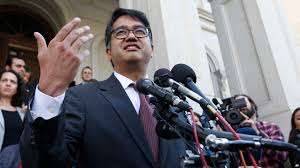The Volokh Conspiracy
Mostly law professors | Sometimes contrarian | Often libertarian | Always independent
So what if Trump's travel ban order might be constitutional if another president issued it?

Defenders of President Trump's travel ban executive order often make much of the fact that the plaintiffs' attorney supposedly admitted it would be constitutional if another president did the same thing. In reality, plaintiffs' attorney Omar Jadwat merely said that "in that case it could be constitutional" (emphasis added). That's not the same thing as conceding it definitely would be. Regardless, this statement does not really help the administration's position.
The case against the travel ban is a pretextual discrimination claim: that the official rationale for the order is actually a smoke-screen for an effort to discriminate against Muslims. The whole point of any pretextual discrimination claim is that an otherwise potentially constitutional action may be unconstitutional because of the illicit motive behind it. In any such case, there is always the possibility that the same policy would be legal if adopted for a different motive.
Consider a government agency that requires all job applicants to have a college degree in order to reduce the number of African-Americans eligible to apply. Given that motive, the employment policy would be unconstitutional. And that is true regardless of the fact that a college diploma requirement might be perfectly legal if adopted for a different purpose. Or consider southern states' use of literacy tests to exclude African-American voters from the franchise. Few doubt that literacy tests might be constitutional if adopted for nonracial reasons.
There is good reason for courts to strike down seemingly neutral policies that are proven to have a discriminatory motive. Otherwise, the government would have a blank check to target unpopular racial, ethnic, and religious minorities, so long as the the law or executive order in question did not explicitly mention race, ethnicity, or religion. And there are many ways to target such groups without directly mentioning them. The government can easily find characteristics that strongly correlate with membership in the group and then disadvantage people who have that trait. That is exactly what the segregationist Jim Crow states tried to do in many situations where courts began to strike down explicit racial classifications.
Some may consider it pointless to strike down a policy that could potentially be reenacted for different reasons. But this overlooks the reality that many such policies are unlikely to be adopted in the first place if not for discriminatory purposes. Trump's travel ban is an example of this very phenomenon. Legal scholar Richard Primus explains the point well:
"If a different president had issued this order, would it be unconstitutional? The question falsely assumes that another president could have issued this order. This order only makes sense from an administration that wants to demonstrate to its constituency that it doesn't like Muslims," Primus said. "Neither Obama nor Clinton, or either President Bush, would have issued this order."
The combination of Trump's numerous statements (detailed in the recent Fourth Circuit travel ban ruling) and the extremely weak security rationale for the order makes it highly unlikely that it would ever have been issued in the first place but for Trump's desire to deliver on his campaign promise to institute a "Muslim ban." That idea that was highly popular among his supporters, and Trump - like most presidents - is trying to deliver on his major campaign promises.
The travel ban case may well be on its way to the Supreme Court. If the justices take up the case, they will have to address a number of important issues. But if they are otherwise inclined to strike it down, they should not stay their hand merely because another president could theoretically issue a similar order for less deplorable reasons.


Show Comments (0)